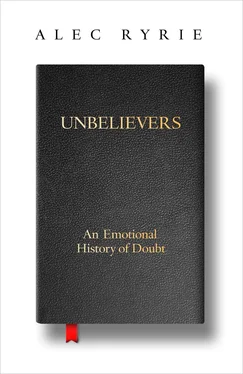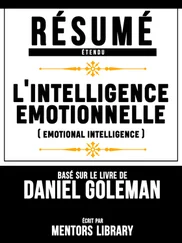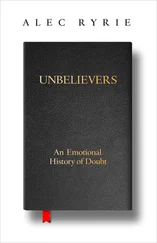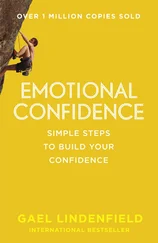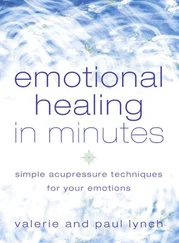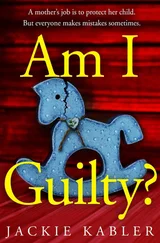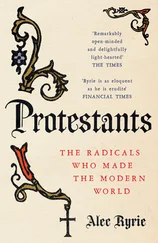Naturally Protestants denied it, insisting they were steering a narrow course midway between the opposing dangers. But the undertow consistently pulled them in one direction, and occasionally they admitted it. Francis Bacon – a tricksy, saturnine Protestant, certainly no religious zealot, but no atheist either – argued in 1612 that atheism was better than superstition. ‘It were better to have no Opinion of God at all; than such an Opinion, as is unworthy of him.’ He justified this with a lawyer’s technicality – that ignorance is better than slander – but also with a disconcerting claim: the historical record, he reckoned, showed that atheism was less likely to lead to public calamities than superstition. [10]Plenty of Protestants who would wince at such frankness nevertheless agreed. Better to brave the dangerous wilderness of unbelief than to return to Rome’s dungeon of superstition. That was how Henry More, a subtle English Protestant theologian of the mid-seventeenth century, explained the growth of atheism in his own times. In the Reformation, he argued, God had graciously permitted ‘a more large release from Superstition … a freer perusal of matters of Religion, than in former Ages’. The devil, however, had spotted an opportunity ‘to carry men captive out of one dark prison into another, out of Superstition into Atheism itself’. The smashing of the ‘external frame of godliness’, which had kept medieval Europeans in ‘blind obedience’, meant that many of them now simply gave in to their unrestrained sinfulness: ‘Being emboldened by the tottering and falling of what they took for Religion before, they will gladly … conclude that there is as well no God as no Religion.’ [11]More saw opposing this kind of atheism as his life’s work. There was, however, one solution he would never consider: to rebuild the prison.
As Catholics pointed out, this was not some incidental side effect of the Protestant Reformation. It was integral to it. The Protestants mounted frontal assaults on long-accepted Christian doctrines: transubstantiation, the authority of the pope, the value of relics. They did not merely argue that Catholic doctrine was incorrect, but mercilessly mocked anyone gullible enough to believe the ridiculous lies with which priests feathered their nests. So when, for example, a Catholic missionary was exposed as defending forged miracles on the grounds that ‘godly credulity doth much good, for the furthering of the Catholic cause’, it played directly into the Protestants’ narrative. [12]The problem was that to mock ‘godly credulity’ was to play with fire. Protestants were still Christians. Indeed, they preached the supreme value of faith. They derided credulity, but had no wish to foster incredulity.
This problem – how do you reject some beliefs while still embracing others? – is an old one for Christians. Traditionally the solution involves carefully chosen acts of defiant credulity: avowing your belief in the unbelievable specifically because it is unbelievable, because that is how you show that your faith has transcended reason. Orthodoxy means submitting yourself – including your faithless, sceptical mind – to the teaching of the Church; heresy literally means ‘choice’, the choice to follow your own wayward thoughts. To be orthodox, then, was to defy those thoughts and obey instead. Among mystics, it was a pious discipline; the third-century theologian Tertullian famously claimed to believe in Christ’s incarnation ‘because it is absurd’. Among religious polemicists, this can degenerate into a kind of pious eating contest, in which the contestant who can swallow the most implausible claim wins. The result is that religious opponents may find themselves arguing simultaneously both that their beliefs are reasonable, true and self-evident, and also that those beliefs are mysteries which surpass reason and are inaccessible except through faith. For in Christian terms, that is itself one of the most powerful logical proofs that a doctrine is true.
It is important to be clear that this approach is not anti-rational. If it looks so to us, that is because – and this will be a crucial element of our entire story – we understand reason differently from our forebears. Since the eighteenth century, we have thought of reason as a method: the application of logic to solving problems, a steady, prosaic and scientific process. To medieval and early modern minds, reason was not a method but a power of perception: almost a sixth sense. For example: how do you know that 1 + 1 = 2? Modern philosophy has struggled mightily with that question, but the pre-modern view is that the question is unanswerable. You simply know intuitively that it is so, and the (God-given) faculty of intuition which provides that knowledge is called reason . If you possess that faculty, then 1 + 1 = 2 is self-evidently true. If your reason is defective, or absent, you will not be able to see it; in which case, there is no persuading you. Blaise Pascal, the seventeenth-century mathematician and mystic who sat at the fulcrum of these two views of reason, distinguished between the ‘mathematical’ and the ‘intuitive’ mind. There are uncontested truths, he argued, which the mathematical mind cannot prove, such as ‘knowledge of first principles, like space, time, motion, number’. [13]To accept such truths is an act of reason, but not a process of logical deduction. It is much more like a leap of faith.
In which case, the most important thing reason has to teach us is that reason itself is fallible. Since reason is a power to perceive truths that lie outside us, there is in fact nothing more rational than to submit your reason humbly to those authorities that are set above it. The word for that is faith . To defy those authorities in the name of reason is to do violence to reason itself. So if there is any apparent conflict between our frail and fallible rationality and the certainties of the true faith, it stands to reason that reason should give way. In its own way, this principle still holds. Many of us, in the modern world, might struggle to refute a flat-earther armed with jargon and ingenious technicalities. But we trust that there are astronomers who can, and are content to submit our reason to their authority.
The Protestant Reformation, by using reason as a battering ram against the papacy, destabilised this entire structure. Catholics quickly became convinced that their enemies were decaying ‘from faithful believing, to carnal reasoning’. [14]And so, as well as fighting fire with fire, and defending their doctrines as logical and rational, Catholics emphasised that the Protestants were guilty of something much worse than honest mistakes about theology. They were revealing themselves to be incredulous – and therefore, in Christian terms, self-evidently wrong. At the heart of the Reformation struggles was a battle for credulity.
The chief arena of this battle was that perennial lightning rod for scepticism, the doctrine of transubstantiation. Protestants were bitterly split among themselves over what to make of the sacrament of the Eucharist. Martin Luther continued to insist that Christ’s body was physically present in the bread and wine, while Calvinist and Reformed Protestants talked of a spiritual or even merely a symbolic presence. But they were united in rejecting transubstantiation, and many of their arguments against it boiled down to claiming that it was impossible, ridiculous, or an offence against reason. To call something impossible, however, was to say that God could not do it – which sounded blasphemous. Catholics worked hard to turn this into a dispute over whether God had the power to perform the miracle of transubstantiation. It was strikingly rare for Protestants to give what might seem the obvious rejoinder: that God could do it but there was no reason to believe he actually did. [15]
Читать дальше
